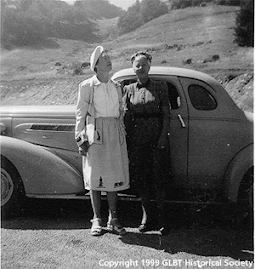Natalie Barnes
Born in 1876 to a wealthy and socially prominent Washington, D.C., family, Natalie Clifford Barney wasn't like most young women of her generation. For one thing, she had a deep, lifelong interest in literature and the arts encouraged by her mother, painter Alice Barney. For another, she was an unapologetic lesbian at a time when even educated people considered homosexuality a sickness.
Natalie made Paris her home not only because it was then the center of the cultural world, but because having an ocean between her and America helped keep her family from being embarrassed by her scandalous affairs. (She numbered among her lovers courtesan Liane de Pougy, poet Renee Vivien, and painter Romaine Brooks, none of whom distracted her from conducting dozens of flings of various durations.)
Although Barney published several volumes of poetry and other short works during her lifetime, her reputation rests primarily on the salon she founded in the 20s [sic] and continued to run almost until her death in 1972.
During its heyday between the wars, virtually every major literary figure who passed through Paris seems to have attended, including Colette, Anatole France, Pierre Louys, Gertrude Stein, Ezra Pound, and Djuna Barnes. Rodriguez describes Barney's life in a lively, if occasionally somewhat breathless manner. The impression of Barney that emerges seems less that of a prototypical feminist icon than of the high-spirited product of a privileged upbringing who, having been denied nothing as a child, saw in turn no reason to deny her own feelings as an adult.
It's a fascinating portrait of someone who, to paraphrase Oscar Wilde, put her talent into her work but her genius into her life.
A unique period in history viewed through the lens of a unique individual's life.
Born in 1876 to a wealthy and socially prominent Washington, D.C., family, Natalie Clifford Barney wasn't like most young women of her generation. For one thing, she had a deep, lifelong interest in literature and the arts encouraged by her mother, painter Alice Barney. For another, she was an unapologetic lesbian at a time when even educated people considered homosexuality a sickness.
Natalie made Paris her home not only because it was then the center of the cultural world, but because having an ocean between her and America helped keep her family from being embarrassed by her scandalous affairs. (She numbered among her lovers courtesan Liane de Pougy, poet Renee Vivien, and painter Romaine Brooks, none of whom distracted her from conducting dozens of flings of various durations.)
Although Barney published several volumes of poetry and other short works during her lifetime, her reputation rests primarily on the salon she founded in the 20s [sic] and continued to run almost until her death in 1972.
During its heyday between the wars, virtually every major literary figure who passed through Paris seems to have attended, including Colette, Anatole France, Pierre Louys, Gertrude Stein, Ezra Pound, and Djuna Barnes. Rodriguez describes Barney's life in a lively, if occasionally somewhat breathless manner. The impression of Barney that emerges seems less that of a prototypical feminist icon than of the high-spirited product of a privileged upbringing who, having been denied nothing as a child, saw in turn no reason to deny her own feelings as an adult.
It's a fascinating portrait of someone who, to paraphrase Oscar Wilde, put her talent into her work but her genius into her life.
A unique period in history viewed through the lens of a unique individual's life.























No comments:
Post a Comment